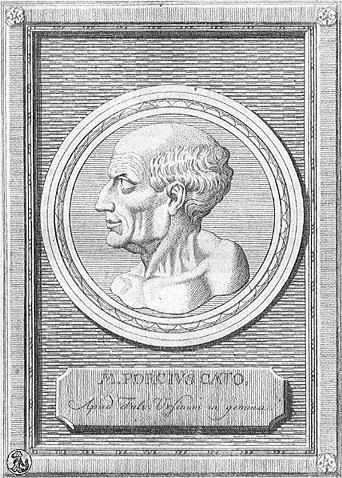Excerpted from the 13th article of William Pierce’s “Who We Are: a Series of Articles on the History of the White Race”:
Wealth inexorably undermined the old virtues. Decadence rotted the souls of the noble Romans. While the mongrel mobs were entertained by the debased spectacles in the Colosseum (not unlike the distraction of today’s rabble by non-stop television), the patricians indulged themselves with every new vice and luxury that money and a resourceful merchant class could provide. Pampered, perfumed, manicured, and attended by numerous slaves, the effete aristocracy of the first century A.D. was a far cry from the hard and disciplined ruling class of a few centuries earlier.
Just as there are Americans today who understand where the weakness and lack of discipline of their people are leading them and who speak out against these things, so were there Romans who tried to stem the tide of decadence engulfing the Republic. One of these was M. Porcius Cato, “the Censor” (234–149 bc), whose public career spanned the first half of the second century B.C.
Cato was born and raised on his father’s farm and then spent 26 years fighting in Rome’s legions before entering politics. Early in his career, having been appointed governor (praetor) of Sardinia, Cato set the pattern he would follow the rest of his life: he expelled all the moneylenders from the island, earning the undying hatred of the Jews and a reputation as a fierce anti-Semite.
Archreactionary
Later Cato was elected censor in Rome. The duties of a censor were to safeguard public morality and virtue and to conduct a periodic census of people and property for military and tax purposes. Cato took these duties very seriously. He assessed jewelry and other luxury items at ten times their actual value, and he dealt promptly and severely with disorder and degeneracy.
 In the Senate Cato spoke out repeatedly against the foreign influences in philosophy, religion, and lifestyle which were encroaching on the traditional Roman attitudes and manners. As a result, Rome’s “smart set” condemned him (privately, for he was too powerful to attack openly) as an archreactionary and an enemy of “progress.”
In the Senate Cato spoke out repeatedly against the foreign influences in philosophy, religion, and lifestyle which were encroaching on the traditional Roman attitudes and manners. As a result, Rome’s “smart set” condemned him (privately, for he was too powerful to attack openly) as an archreactionary and an enemy of “progress.”
In the field of foreign policy, Cato was adamantly opposed to the integration of the Semitic East into the Roman world. He wanted Rome to concentrate on the western Mediterranean and to deal with the Levant only at sword point. Unfortunately, there were few men of Cato’s fiber left among the Romans by the second century.
Declining Birthrate
One of the most fateful effects of decadence was the drastic decline in the birthrate of the Roman nobility. Decadence is always accompanied by an increase in egoism, a shifting of focus from race and nation to the individual. Instead of looking on bearing and raising children as a duty to the state and a necessity for the perpetuation of their gens and tribe, upper-class Romans came to regard children as a hindrance, a limitation on their freedom and pleasure. The “liberation” of women also contributed heavily to this change in outlook.
The failure of the patrician class to reproduce itself alarmed those Roman leaders with a sense of responsibility to the future. Emperor Augustus tried strenuously to reverse the trend by issuing several decrees regarding family life. Heavy penalties were set for celibacy or for marriage with the descendants of slaves. Eventually, Augustus ordered that every noble Roman between the ages of 25 and 60 must be married or, at least, betrothed.
Suicide of the Nobility
In 9 A.D. tax advantages and other preferences were granted to the parents of three or more children; unmarried persons were barred from the public games and could not receive inheritances, while the childless married person could receive only half of any inheritance left to him.
All these measures failed. Augustus’ own daughter, Julia, was a thoroughly liberated member of the “jet set” of her time, who considered herself far too sophisticated to be burdened with motherhood. In embarrassment, Augustus banished her to an island.
From the dictatorship of Julius Caesar to the reign of Emperor Hadrian, a century and a half, one can trace the destinies of 45 leading patrician families: all but one died out during that period. Of 400 senatorial families on the public records in 65 A.D., during the reign of Nero, all trace of half of them had vanished by the reign of Nerva, a single generation later.
Rise of Capitalism
As the patricians declined in numbers, the Roman peasantry also suffered, but for a different reason. The later years of the Republic saw the rise of agricultural capitalism, with wealthy entrepreneurs buying up vast estates, working them with slaves and driving the freeborn small farmers out of the marketplace.
By the tens of thousands the Latin and Sabine yeomen were bankrupted and forced to abandon their farms. They fled to the city, where most of them were swallowed up in the urban mob.
“New Romans”
The capitalist nouveaux riches who came to wield much of the power and influence in Rome lost by the dwindling patricians were an altogether new type of Roman. Petronius’ fictional character Trimalchio is their archetype. Tenney Frank wrote of these “new Romans”:
It is apparent that at least the political and moral qualities which counted most in the building of the Italian federation, the army organization, the provincial administrative system of the Republic, were the qualities most needed in holding the Empire together. And however brilliant the endowment of the new citizens, these qualities they lacked. The Trimalchios of the Empire were often shrewd and daring businessmen, but their first and obvious task, apparently was to climb by the ladder of quick profits to a social position in which their children, with Romanized names, could comfortably proceed to forget their forebears. The possession of wealth did not, as in the Republic, suggest certain duties toward the commonwealth.
Different Spirit
Many historians have remarked on the fact that the entire spirit of the Roman Empire was radically different from that of the Roman Republic. The energy, foresight, common sense, and discipline which characterized the Republic were absent from the Empire. But that was because the race which built the Republic was largely absent from the Empire; it had been replaced by the dregs of the Orient.
The change in attitudes, values, and behavior was due to a change in blood. The changing racial composition of Rome during the Republic paved the way for the unchecked influx of Levantine blood, manners, and religion during the Empire.
But it also set the stage for a new ascendancy of the same Northern blood which had first given birth to the Roman people. We will look at the conquest of Rome by the Germans. First, however, we must backtrack and see what had been happening in the North during the rise and fall of Rome.
